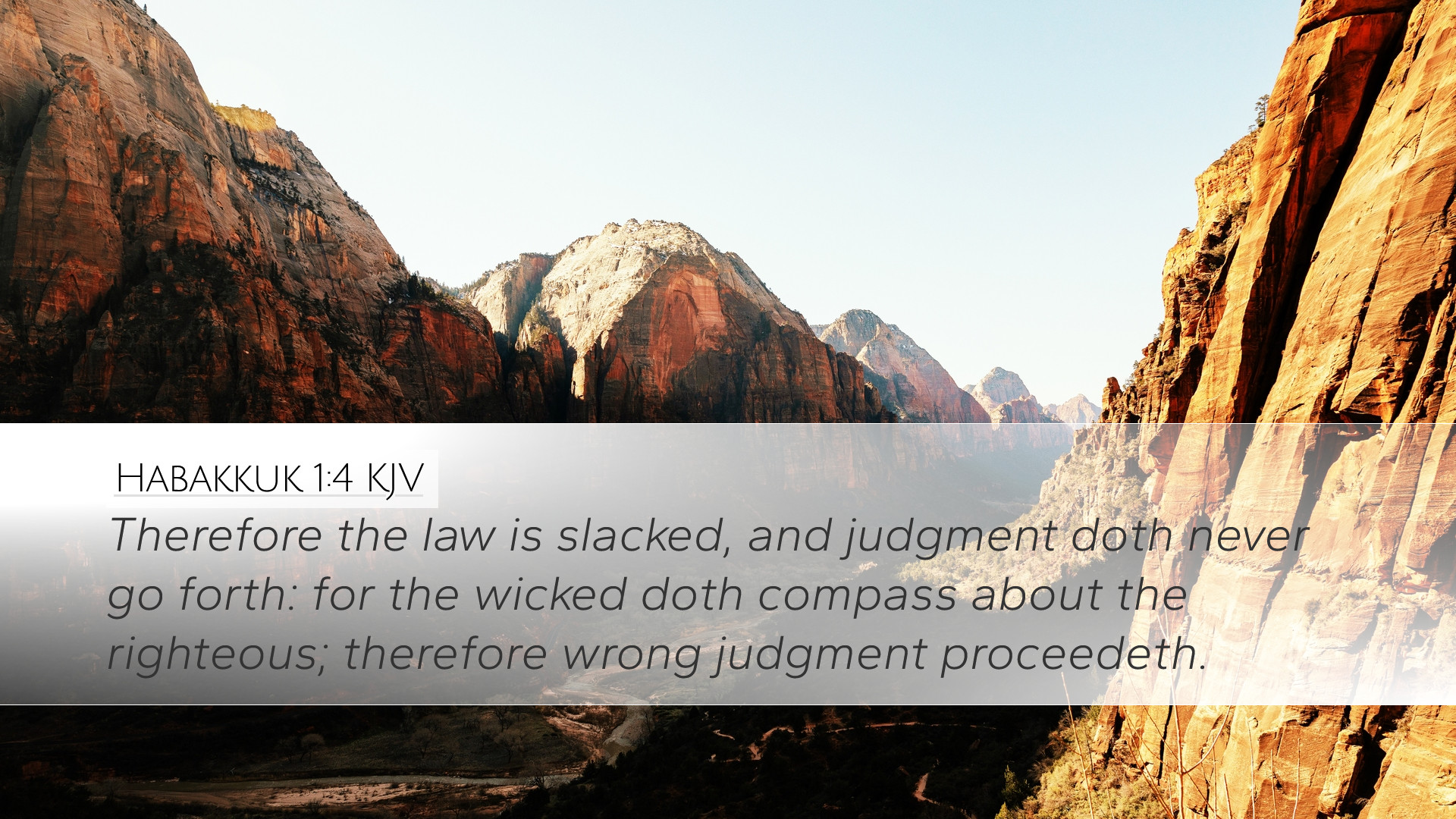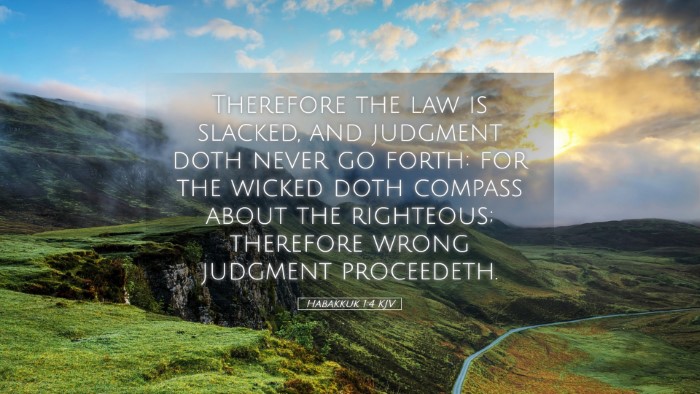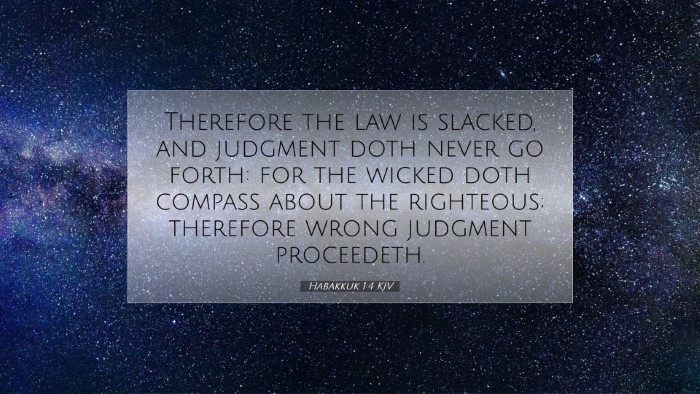Old Testament
Genesis Exodus Leviticus Numbers Deuteronomy Joshua Judges Ruth 1 Samuel 2 Samuel 1 Kings 2 Kings 1 Chronicles 2 Chronicles Ezra Nehemiah Esther Job Psalms Proverbs Ecclesiastes Song of Solomon Isaiah Jeremiah Lamentations Ezekiel Daniel Hosea Joel Amos Obadiah Jonah Micah Nahum Habakkuk Zephaniah Haggai Zechariah MalachiHabakkuk 1:4
Habakkuk 1:4 KJV
Therefore the law is slacked, and judgment doth never go forth: for the wicked doth compass about the righteous; therefore wrong judgment proceedeth.
Habakkuk 1:4 Bible Commentary
Commentary on Habakkuk 1:4
Habakkuk 1:4 states: "Therefore the law is slacked, and judgment doth never go forth: for the wicked doth compass about the righteous; therefore wrong judgment proceedeth." This verse encapsulates a deep lament over perceived injustice and societal decay.
Contextual Background
Understanding Habakkuk's message demands an awareness of the historical context in which he prophesied. The prophet lived during a tumultuous period in Judah, characterized by moral decline, idolatry, and the impending threat of Babylonian invasion. His questions arise from a heart burdened by the overwhelming evil around him and a paradox concerning God's justice.
Insights from Matthew Henry
Matthew Henry emphasizes the prophet's despair over the inaction of the Law in the face of injustice. He observes that the law, which was intended to provide guidance and a framework for justice, appears to be ineffective or disregarded. Henry notes: "The law is slack; there is no execution of justice. The wicked carry all before them, trample on the righteous, and therefore wrong but wants execution."
This interpretation sheds light on the consequences of ignoring divine law. When injustice prevails, the moral fabric of society unravels, leading to further chaos and division. Henry's commentary serves as a reminder to uphold the principles of justice and righteousness, even when it seems unpopular.
Insights from Albert Barnes
Albert Barnes provides a theological angle to the crisis expressed in Habakkuk 1:4. He argues that the prophet's cry reflects the broader human experience of suffering amid injustice: "There is a complaint here that the law was allowed to be violated and that justice was so perverted that the wicked had great power over the righteous."
Barnes highlights the role of divine sovereignty in human affairs, suggesting that even when it appears that God is silent or inactive, He is still sovereignly orchestrating events for His ultimate purposes. This perspective encourages a faithful trust in God, despite the visible chaos around us.
Insights from Adam Clarke
Adam Clarke delves into the implications of this verse from a social ethics viewpoint. He states: "A state of society in which the law is not executed is the worst of all states; it is a sign that society has lost its way."
Clarke interprets the phrase "the law is slacked" as a grave indicator of societal failure, emphasizing the necessity of upholding justice for the flourishing of society. He also pharaphases the latter part of the verse, noting how the righteous become vulnerable to the pervasive influence of the wicked.
Theological Implications
These commentaries collectively underscore significant theological implications derived from Habakkuk 1:4:
- The Nature of God’s Justice: The verse prompts profound reflections about God’s justice. Why is He silent when the wicked prosper? This tension runs throughout Scripture, leading to questions about divine timing and human suffering.
- The Role of the Righteous: The plight of the righteous is central to Habakkuk's lament. They find themselves surrounded by wickedness, leading them to question their purpose. This resonates with many believers today who may feel marginalized in increasingly secular societies.
- Human Agency and Divine Sovereignty: The paradox between human choices and God’s sovereignty surfaces in this discourse. While humans act unjustly, God remains sovereign and, ultimately, will establish justice.
- Call to Action: The insights gleaned from this verse compel believers to advocate for righteousness and justice within their communities, embodying the prophetic mantle of Habakkuk.
Conclusion
In conclusion, Habakkuk 1:4 serves as a poignant reminder of the struggles inherent in the human experience when confronted with injustice. By synthesizing insights from esteemed commentators like Matthew Henry, Albert Barnes, and Adam Clarke, we find a multifaceted understanding of the challenges faced by both the ancient prophet and contemporary believers.
These insights point us to a God who, although seemingly distant at times, remains actively involved in history, upholding His justice ultimately. The faithful are encouraged to persist in prayer, to seek righteousness, and to trust in God's perfect timing and sovereignty in addressing injustice.


